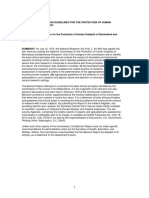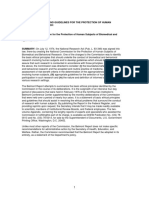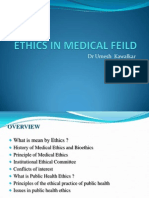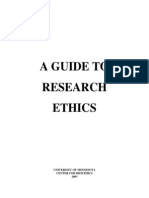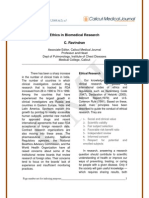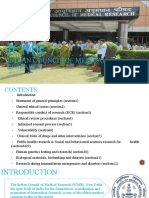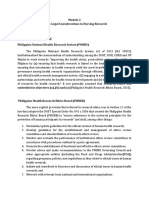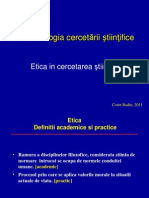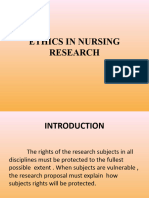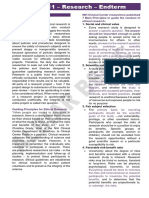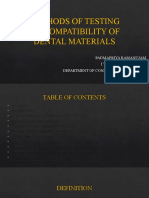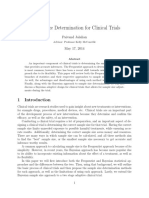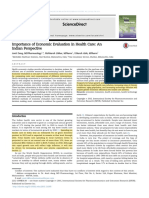INTRODUCTION
Medical research is defined as, a systematic study of pharmaceutical products on human
beings in order to discover or verify the adverse effects, with the object of determining
their safety and efficacy. Physician’s primary responsibility is the health and well- being
of the patient. A physician when acting as a researcher aims at the generation of
knowledge, which may or may not contribute any benefit to that particular patient.
Application of ethics to the field of medicine is concerned with moral principles for the
members of the profession.
Most medical research is based on evidences rather than hunches or preferences. It
follows a series of specific steps and there are no short cuts. Collection of evidence and
its analysis may follow a careful drawn protocol. Most of the modern medical research
requires researchers with adequate knowledge and skill to use biostatistical tools to reach
to a valid and reliable conclusion.
Ensuring the safety of everyone that comes into contact with health services is one of the
most important challenges facing health care today. The process of exposing human
beings to risks in order to collect data introduces the possibility of exploiting subjects for
the benefit of future patients. There is a long history of medical research that involves
intentionally infecting healthy people in order to study diseases and their treatments.
When something goes wrong we should learn from the experience and through that
learning, strive to reduce the risk to future research subjects.
The death of 254 Indian women during the course of a 15-year US-funded medical
research, conducted without giving adequate information to give informed consent has
triggered a debate about its ethicality as it is clear that many are performing cruel
experiments and killing lacks of human beings every year in the name of medical
research.
�Medical research is considered to be biomedical or health related research studies in
human beings that follow a pre-defined protocol. Statistics say that only one molecule out
of 5000 new discoveries reach the pharmacist shelf after undergoing various evaluation
phases. Every new chemical entity discovered must pass through all the phases of clinical
trials to enter into the market. Drug designing, Drug Discovery, animal testing, testing
only in a few human beings, testing in many study participants if the trial seems safe and
useful.
Medical research based on ethical principles must be encouraged, in order to improve the
well-being and to protect the right to life and health of the human beings. A legal
framework without compromising basic human rights and ethical principles are necessary
for the introduction of new medicines for new types of diseases. Legal regulations play
an important role in this.
Historical Background
History reveals that, Violations of our basic rights and human dignity occurs in settings
where we expect protection of the ideals of human rights. The oldest code of medical
ethics is the Hippocratic Oath, which was modified by the World Medical Association
and came to be known as Geneva Declaration. Even though, Geneva Declaration guided
main stream medical practice, instances of violations of ethical principles for the sake of
advancements of medical science have been reported in the pre-war Nazi Germany and
later on in the concentration camps resulted in the prosecution of the doctors in 1947.
Instances of inhuman procedures in the name of medical research continued even after
the Nuremberg code which led to the introduction of the Declaration of Helsinki in 1964.
The scope of ethics was further broadened to include all types of biomedical research
involving human subjects in 1975 at the 29th WMA Convention in Tokyo. In 1979,
United States, National Commission for the Protection of Human Subjects of Biomedical
and Behavioral Research articulated the Belmont Report, which outlined three
fundamental ethical principles for the protection of human subject in medical research. In
1982, the World Health Organization and the Council for International Organization of
Medical Science (CIOMS) Proposed “International Guidelines for Biomedical Research
�involving Human Beings”. Later International Ethical Guidelines for Biomedical
Research involving Human Subjects was brought out by CIOMS in the year 1993.
Since then over the years many countries have developed their own national guidelines.
The Indian council of Medical Research (ICMR) in the year 1980 released a policy
statement on Ethical Considerations involved in Research on Human Subjects to be
followed in India for medical research. Subsequently, the central ethics committee on
Human Research modified the guidelines, from time to time, for conducting any medical
research involving human beings. The latest of these guidelines were issued in 2006 by
ICMR which forms the basis of all biomedical research ethics in India.
The ICMR guidelines state that all proposals on medical research involving human
participants have to be declared by the Institutional Ethics Committee (IEC). The
committee is setup to safeguard the welfare and the rights of the participants. All these
guidelines gives importance to the doctrine of informed consent as an ethical and legal
requirement.
Ethical Principles and the Doctrine of Informed Consent
Consenting to a particular procedure after getting all information about the pros and cons
of a research is informed consent. It is built from a complex interrelation of medico legal
and ethical principles. The issues around informed consent remains problematic even
after much analysis over many years. Consolidating the rules and principles relating to
informed consent is not an easy task because of different factors. The concepts involved
in the doctrine of informed consent like decision making capacity, voluntariness and
freedom to decide are difficult to perceive clearly. Almost all are indistinct. It can
become clearer only through further elaboration and specification in the context in which
they are used. Making common people understanding all these concepts and getting
consent is very difficult. The manner of conveying and by whom the matter is conveyed
also really matters.
When we look at the quality of informed consent in the whole country, there are many
suspicious situations. Does anyone really explain the procedure of trials to participants?
� There is a need to improve the whole system, of informed consent process, so that
researchers may be able to take the time to explain to participants. In cases in which the
things are being explained, the researcher may say, “We are doing this treatment, we are
going to use this medicine, we think it will work”, and immediately (the participant) says,
“Yes we agree”. Whether it is the public sector or the private sector, where we think the
patients are more knowledgeable, the situation is same. Patients think the doctors are
doing something for their good. It is essential to find out whether these ethical principles
and the requirements of the doctrine of informed consent are properly followed by a
doctor when he plays the role of a researcher while conducting medical research. A
successful implementation of the doctrine of informed consent in practice has yet to
occur. Ethics demands that when a researcher seeks knowledge about safety and
efficiency of medicine, which is for a social good, the dignity of the individuals may not
be overridden. David N. Weisstub opines that when a researcher is in the midst of actual
ethical decision- making, it is rare to see the ethical values being presented, defined and
logically justified1. Richard E. Ashcroft opines that in the last thirty years the oversight of
medical research has become increasingly formalized and institutionalized in an attempt
to ensure that research is ‘ethical,’ specifically in terms of respecting individual rights.
At the same time there continue to be high expectations of the professionalism and
integrity of the medical profession2.
It is natural and unpredictable that a best intentioned researcher may go wrong about
the efficiency and safety of the procedures involved. The failure to achieve expressed
value formulations leads directly to moral turpitude and pragmatic failure. These
situations may be remedied to an extent by employing ethical principles during the
procedure of medical research. It is essential that all medical research may be conducted
according to the strict ethical principles or standards to infuse trust in the public and to
the participants.
1
David N.Weisstub , Roles and Fictions in Clinical and Research Ethics. Health Law Journal Vol.4,1996, 259-282.
2
Richard E. Ashcroft, The Ethics and Governance of Medical Research: what does regulation have to do with
morality? New Review of Bioethics, Vol. 1, No. 1, 41–58, November 2003.
� Commercialization of Medical Research
If a pharmaceutical company is endowed with the ability to develop promising treatments
in critical care medicine by using stem cells, but is prevented from pursuing these goals
due to financial constraints, the company may be allowed to seek out global investment
opportunities without fear of retribution or restrictions, as long as it operates in
accordance with international law. Such an opportunity facilitates commercialization of
medical research.
We live in a world where economic and commercial interests exercise ever growing
pressure over the financing and orientation of medical research. Conducting medical
research is a service to the society as it generates new knowledge. There is tremendous
commercial advantage to the firms that produces the first approved drug for a disease.
Biotechnological and pharmaceutical corporations are investing large sums for medical
research3. Institutions conducting medical research are themselves growing increasingly
beholden to industry. In 2005, India introduced patent protection laws. Since then, it has
become a global hub for medical research.
Since January 2005, India is now on level with developed nations by becoming compliant
with the Trade Related Intellectual Property Rights Act (TRIPS). A major reason for the
decline of professional values is the growth of commercialization of the health care
systems. Most researches that bring new drugs from bench to bedside are financed by
pharmaceutical companies with high commercial interest . Anywhere in the world,
medical research is a carefully regulated area because of the obvious risks involved.
Without adequate and strict regulatory tools the pharmaceutical companies escapes from
the liability to ensure relief and compensation to those gravely affected by medical
research. It is essential to protect patients enrolled in clinical trials, but the government
also have the duty to find out better ways to protect professionals also. Without adequate
3
The amount invested for medical research and development was approximately $1.5 billion. See, Haber, E(1996)
Industry and the University. Nature Biotechnology 14:1501-1502.
� protection to the professionals the progress in medical research in India may come to a
standstill, particularly in controversial and distressing areas.
Legal Frame work in India
DCGI has the Prime responsibility for regulating medical research in India. Under the
Drugs and Cosmetics Rules, it is mandatory to obtain a license before manufacturing or
importing or marketing a new drug in India. Part XA ( Rules 122A to 122E) says about
the conditions for making applications for the grand of a license to import and
manufacture a new drug as defined in 122E. In 1988, Schedule Y was incorporated into
the Drugs and Cosmetic Rules for governing the manner and the mode of conducting
clinical trials in India. Under the Drugs and Cosmetics Act, all trials in India may follow
the ICMR guidelines of 2000. The Medical Council of India (MCI) Act, amended in
2002, states that all research in India carried out by physicians has to follow the ICMR
guidelines. So there is indirect power to enforce our guidelines. But what are the
loopholes leading to noncompliance of these provisions needs to be studied.
Medical Research and Compensation for death or injury
The compensation in the case of injury or death during medical research is governed by
new guidelines issued on January 30, 2013. The Drugs And Cosmetics (Amendment)
Bill, 2013: Regulations For Medical Devices And Conduct Of Clinical Trial is pending
in the parliament. The Supreme Court while taking up the PIL on 21st of April 2014 by
the Swasthya Adhikar Manch, suggested the government could put up advertisements and
seek applications for payment of compensation to such patients.
India needs to be more cautious in regulating medical research involving human beings.
A concrete regulatory framework is essential for eradicating the evil practices
surrounding medical research.





